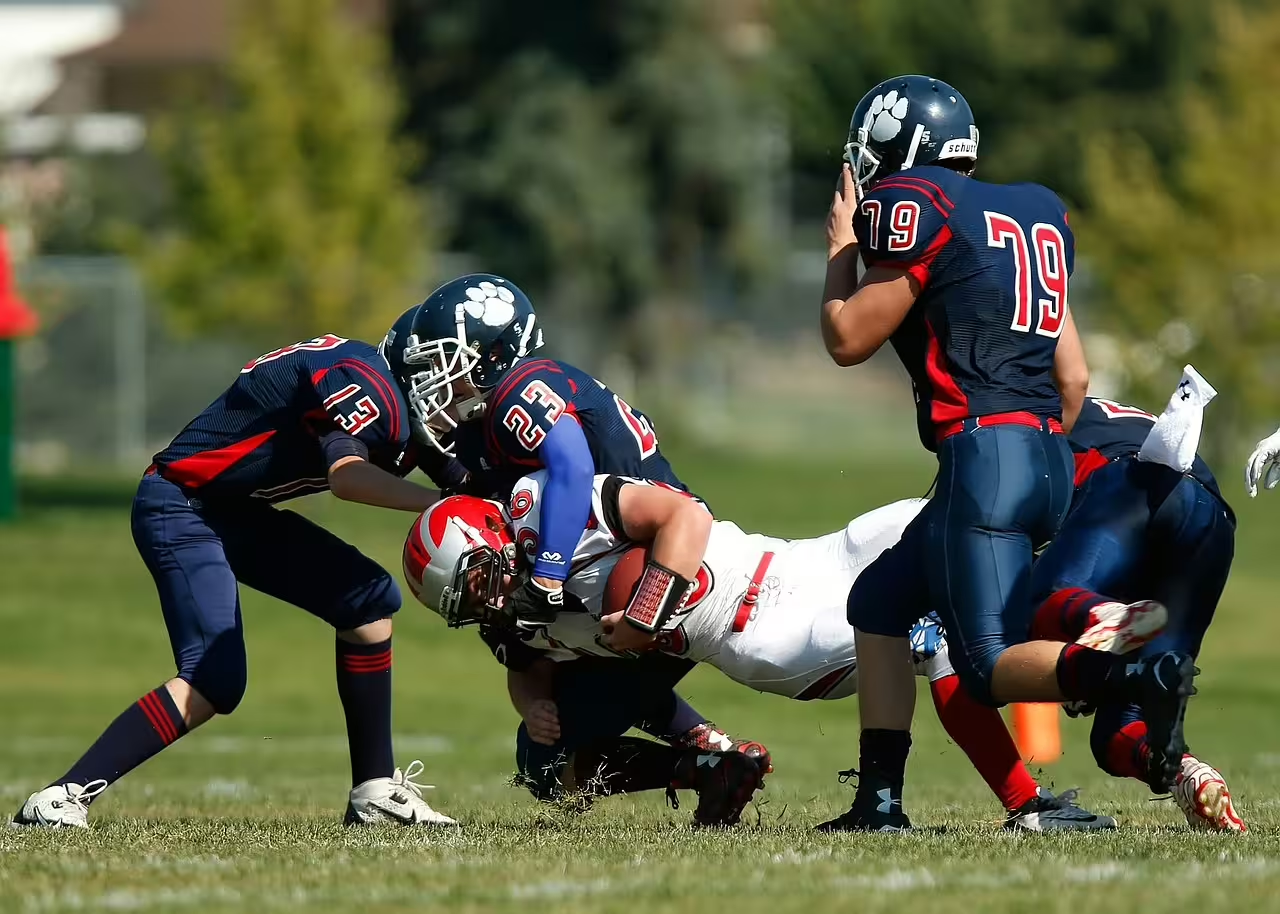As parents, we want our kids to succeed at every task they set their mind to. We want them to excel in school. be good people, and if they play sports, we generally want them to do well. That’s not to say that each and every one of us wants our children to grow up to be the next Aly Raisman, but we want them to do well enough that they feel good about engaging with sports and physical activity in general. Part of this equation is encouraging them to succeed in such a way that it doesn’t result in any undue pressure. After all, kids have enough pressure on them from other sources, we don’t really need to add to it.
That said, there is no doubt that encouraging kids to participate in sports is one of the best gifts a parent can give. Sports are excellent for physical, mental, and emotional development. They teach children valuable lessons about teamwork, discipline, and resilience while giving them the chance to physically active and healthy; even in a time of endless screens and processed snacks. However, finding the right balance between supporting your child and pushing them too hard can prove to be a challenging tightrope for parents to walk.
What many overzealous or even downright over-competitive parents fail to realize is that overemphasis on performance or winning can lead to burnout, resentment, and a loss of love for the game; which kind of defeats the purpose of youth sports in the first place. In this article, we will explore how parents can encourage their children in sports without going overboard. At the same time, we will give concerned parents some tips to ensure that sports remain a source of joy and growth for their kids.
The Benefits of Sports for Kids
Before diving into how to encourage kids without pushing them too hard, it’s essential that parents who are reading understand why sports are so beneficial for children to begin with. Participating in sports offers kids a wide range of advantages that will carry them through life:
- Physical Health: Sports help young children to build strong muscles and maintain a healthy weight. At the same time, they improve cardiovascular fitness, which will be an asset for them as they grow.
- Social Skills: Team sports and even some sports that have squads but don’t need a team to play, teach children how to work with others. These types of sports also help children learn how communicate effectively, and can result in lifelong friendships.
- Emotional Growth: Kids are going to face challenges as they play and make mistakes along the way. But facing those challenges and learning from such mistakes helps children to develop patience, resilience, patience, and the ability to handle failure.
- Mental Focus: Sports are as good for the mind as they are for the body! There is ample evidence that playing sports or indeed, being active in any capacity, can improve concentration. At the same time, playing sports instills discipline, which can translate to better performance in school and later in life.
- Fun: Above all else, sports are one of the best, most beneficial ways for kids to have fun and enjoy themselves, while helping their health and wellness!
Understanding the Fine Line Between Encouragement and Pressure
We spoke earlier about the tightrope that lies somewhere between encouragement and pressure. We know that it’s only natural for parents to want the best for their children, but we often don’t understand if what’s “best” for them is actually best for them, if you catch our meaning. Certainly, some parents might dream of seeing their child excel in sports in such a way that they make it to a professional level someday. The question is, is that what your child wants? Moreover, will that kind of goal ensure that your child is happy in their sports career or simply overwhelmed? The crucial thing to remember in all of this is that your child’s happiness and well-being should always come before lofty ambitions.
Signs of Over-Pushing
Though not all parents are like this, some parents may unintentionally put too much pressure on their children when it comes to sports, in particular. You might not even notice you’re doing it, either. Fortunately, here are some of the most common signs that you might be pushing your kid a little too hard:
- If your child evinces or expresses anxiety or reluctance to attend practice or games, they are probably not having fun. They also might be struggling with something that you might want to have a calm dialogue about.
- If you find yourself overly focused on scores, stats, or their performance, you’re probably a little too invested.
- If conversations about sports dominate family discussions, leaving little room for other interests, then you likely need to ease off and try for another, less stressful subject.
- If you find that you’re more upset about a loss than your child is, it is definitely time to reevaluate your priorities.

The Dangers of Excessive Pressure
Pushing a child too hard can have long-term negative effects on their physical, emotional, and mental well-being. These can include:
- Burnout: Kids may lose interest in sports altogether, which would certainly make keeping them active and healthy more difficult in the future.
- Injuries: Overtraining can lead to physical injuries and hinder a child’s development.
- Strained Relationships: Constant pressure can harm the parent-child bond. These days, this bond is more important than ever, especially to many of us who have our own strained relationship with our parents.
- Mental Health Issues: Stress and anxiety can arise from unrealistic expectations. This is one of the reason we try and focus on realistic goals in many of our discussions at Cultured Athlete. Setting realistic goals is better for achieving those goals and feeling ambivalent about not achieving them; which is certainly preferable to feeling bad about them.
How to Encourage Without Overstepping
By now, many parents are probably wondering what they should do, rather than focusing on what they should not do to encourage their kids. Well, the main key to fostering a positive sports experience is to encourage, support, and inspire your child, rather than overwhelm them. You also need to let them take the lead in their sports journey. That’s not to say you should be totally hands-off, but you need to give them space to make mistakes and make their own choices. Here are some practical tips for achieving this balance:
Focus on Fun
Kids should be able to enjoy the sports they play; that’s the core tenet of this belief system. For parents, maintaining the fun aspect often means prioritizing activities that your child genuinely enjoys. Whether their sport is soccer, swimming, or gymnastics, remember that the primary goal is that they have fun and stay active. Not every kid is going to be an Olympian and that’s OK.
Let Them Take the Lead
We’re not saying you need to give your kid all the power here, in fact, we recommend you don’t do that! That said, you should always ask your child which sports they want to try instead of signing them up for something that you think they’ll like. Even this simple choice will give them a sense of ownership over their own athletic destiny and will go a long way into keeping them motivated to continue.
Celebrate Effort, Not Outcomes
When things get tough, always remain positive for your kids. Parents who impart positive praise for their kid’s hard work, dedication, and sportsmanship, will find that their child is happier and less stressed than they would be if your collective focus was solely on winning. This kind of praise teaches children to value effort and persistence, which are more important for their personal development in the long run.
Be Their Cheerleader, Not Their Coach
Unless you, yourself are a trained coach, it’s best to leave the technical feedback to the professionals. Remember, your role as a parent is important, but it is mostly limited to providing unconditional support and encouragement to your budding athlete. So, cheer as loudly as you can at games, but avoid shouting instructions or lobbing unkind jabs from the sidelines.

Keep a Balanced Perspective
Always remember to keep your perspective in…well….perspective. Sports are just one part of your child’s life. There are many paths your kid might end up walking and one day, that path might take them away from the basketball court. If it does, you need to make peace with that. This is why it’s important to encourage them to explore other interests and hobbies when they aren’t at games or at practice, and never, ever let sports overshadow academics, friendships, or family time.
The Role of Parents in a Child’s Sports Journey
Some of today’s most successful athletes credit their parents for supporting their dreams without pushing them too hard. Both Serena and Venus Williams can thank their supportive father, Richard Williams, for introducing them to tennis. He trained them rigorously, but allowed them to keep a perspective about the importance of education and other, non-sports activities. The same is true for Michael Phelps, the Olympic swimmer whose mother Debbie Phelps, played a crucial role in supporting him all through his career.
Practical Tips for Supporting Your Child
Encourage Rest and Recovery
Rest is just as important as practice and positivity, especially when children are young and still growing. Teach your child how to listen to their body and to take breaks when needed. Make sure they are getting proper sleep, adequate, or even more than adequate hydration, and proper nutrition; these factors are essential for keeping up performance and maintaining a child’s overall well-being.
Avoid Comparisons
We spoke a bit earlier about popular sports stars and their parents, but you cannot compare yourself or your children to those people. Remember, every child is unique, with their own set of strengths and weaknesses; as are their parents. At all costs, avoid comparing your child’s performance to that of teammates or other athletes. Instead, do your best to encourage them to set their own personal goals and measure their progress only against themselves.
Teach Life Lessons Through Sports
Parents who are sports fans themselves can often use sports as a platform to teach valuable life lessons. For example:
- Team sports can teach kids about cooperation and communication.
- Individual sports can help children build self-discipline and accountability.
- Overcoming losses can help young athletes develop resilience and perseverance.
Stay Involved, but Not Overbearing

Being involved in your child’s sports activities is important, it shows that you care. This is why we, as parents, do whatever we can to attend games, volunteer for team events, or help with carpooling. Nevertheless, try to avoid micromanaging their schedules whenever possible and do your best not to interfere with their coach’s decisions.
How to Handle Challenges
Sadly, even with the best intentions, challenges may arise in your child’s sports journey. Fortunately, we can help you to navigate them:
Dealing with Disinterest
If your child begins to lose interest in a sport, don’t panic. Take some time and talk to them so that you understand why they feel this way. It could be due to a number of factors, including burnout, conflicts with teammates, or simply wanting to try something new. This is why it’s so important for parents to encourage open communication. Also, even if you don’t like it, try and support their decision, even if it means exploring a different sport or activity.
Addressing Performance Anxiety
Some kids may feel anxious about performing well; most might, in fact. Parents can help them manage stress by:
- Reminding them that it’s okay to make mistakes, that these are just ways for them to get better for the next time around.
- Encourage them to use relaxation techniques like deep breathing to calm down.
- Emphasize the joy of playing and telling them not to worry so much about the outcome.
Cultured Athlete Says…
As you can see, it might seem difficult to encourage kids in sports without pushing too hard, but it is certainly doable. All it requires us patience, empathy, and a focus on what truly matters: your child’s happiness and personal growth. As parents, we can create a supportive and fun environment that can help our children reap the many benefits of sports while fostering a positive relationship that they may eventually impart upon their own children; and really, that’s the best we can hope for.
Discover more from CulturedAthlete
Subscribe to get the latest posts sent to your email.






